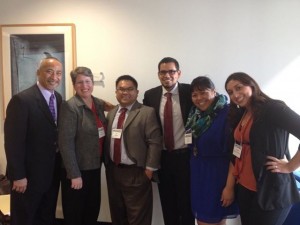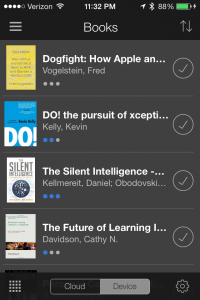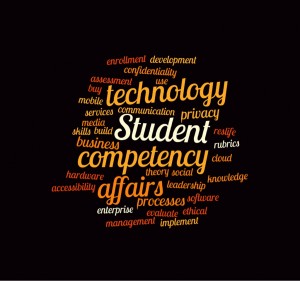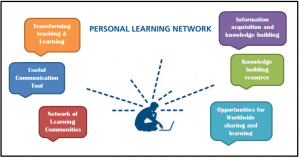 I attended the Western Regional Career in Student Affairs Day (WRCSAD) at Long Beach State University last Saturday as a member of the UCSB NASPA Undergraduate Fellowship Program (NUFP) group. This was my first student affairs conference aside from a student affairs technology conference (satech) in Rhode Island two years ago. I met a few folks I have known via Twitter in person (face-to-face) for the first time. I was also pleasantly surprised to meet a few student affairs pros who told me they’ve been following me on Twitter. The sessions I attended, including “Reflections from Senior Student Affairs Professionals,” “Professionals of Color,” and “Research in Student Affairs,” really invigorated me and validated the work that I do with students and through technology. The opening and closing keynote speakers were dynamic and provided personal perspectives on why they chose student affairs as a career. Another session I attended was “Social Media in Student Affairs.” The panel provided insights on their personal/professional use of social media. The students and professionals in attendance also asked questions about issues/concerns they have about social media, and one even shared their hesitation about using it. As I listened to the discussion, I thought about the different ways I use social media and how student affairs use it. I was also thinking about the message from the opening keynote speaker, Dr. Dyrell Foster, Dean of Student Affairs from Rio Hondo College. Here are some of the topics he shared and how I think social media relate:
I attended the Western Regional Career in Student Affairs Day (WRCSAD) at Long Beach State University last Saturday as a member of the UCSB NASPA Undergraduate Fellowship Program (NUFP) group. This was my first student affairs conference aside from a student affairs technology conference (satech) in Rhode Island two years ago. I met a few folks I have known via Twitter in person (face-to-face) for the first time. I was also pleasantly surprised to meet a few student affairs pros who told me they’ve been following me on Twitter. The sessions I attended, including “Reflections from Senior Student Affairs Professionals,” “Professionals of Color,” and “Research in Student Affairs,” really invigorated me and validated the work that I do with students and through technology. The opening and closing keynote speakers were dynamic and provided personal perspectives on why they chose student affairs as a career. Another session I attended was “Social Media in Student Affairs.” The panel provided insights on their personal/professional use of social media. The students and professionals in attendance also asked questions about issues/concerns they have about social media, and one even shared their hesitation about using it. As I listened to the discussion, I thought about the different ways I use social media and how student affairs use it. I was also thinking about the message from the opening keynote speaker, Dr. Dyrell Foster, Dean of Student Affairs from Rio Hondo College. Here are some of the topics he shared and how I think social media relate:
Congruence of personal and professional values:
Dr. Foster spoke about how his personal life experience and the values he learned from his family are consistent with his professional value system. I think the topic of “authenticity” comes up from time to time when it comes to how one represents themself on and off social media. Do we share/relate with others online as we do “face-to-face”? In addition, how much can we separate our personal and professional lives on social media? Similarly, when it comes to our work, how much can we separate our values/perspectives from our work?
What is your reputation/legacy?
Dr. Foster asked the questions of what will be your reputation and the legacy we will leave behind. I think reputation is subjective; it’s how others define you from their perspectives. As personal as it is, I believe through our consistent actions and what we share, we develop a reputation(s), and we do have the ability to shape how others view us based on how we act online or what we share through our Facebook statuses, Instagram photos, Vine and YouTube videos, tweets, Linkedin profiles, and our blogs. With regards to legacy, what we write has the potential to be read and shared by more folks than we probably intended and, in some cases, even become the foundation for new projects at individual and institutional levels.
Who are your mentors/who will you mentor?
Dr. Foster also reminded the audience that student affairs are a tiny field and that the student/pro we are sitting with may be the one who will hire you or will connect you to the person who will be able to help you. Thank your mentors, he also said. I’ve met a few folks via social media who I’ve come to respect and follow. These are folks in student affairs, higher education, and technology fields. Since joining Twitter on August 9, 2010, I’ve had the opportunity to share some of my personal experiences and advice with graduate students and other student affairs professionals. I consider mentoring a relationship, so my experience with others on social media may not be defined as “mentorship.” However, the potential for conversations that started via social media could lead to meaningful mentoring relationships.
As student affairs professionals, our identities and value systems are very much related to our work. I think the enjoyment and satisfaction we receive from our jobs relate to how aligned our value systems are with our work. The folks around us and the communities we work with also matter. Our communities have become more extensive in this digital age than on our physical campus. Social media also changes our identities and the impact of what we do.
 This year has been an intense learning experience for me. It was a year of learning driven by curiosity, the need for background information for projects with folks I met via social media, and in preparation for major projects at work. In addition, a significant portion of my learning came through reading, mostly on my iPhone and kindle app. The topics I read include the following:
This year has been an intense learning experience for me. It was a year of learning driven by curiosity, the need for background information for projects with folks I met via social media, and in preparation for major projects at work. In addition, a significant portion of my learning came through reading, mostly on my iPhone and kindle app. The topics I read include the following:

